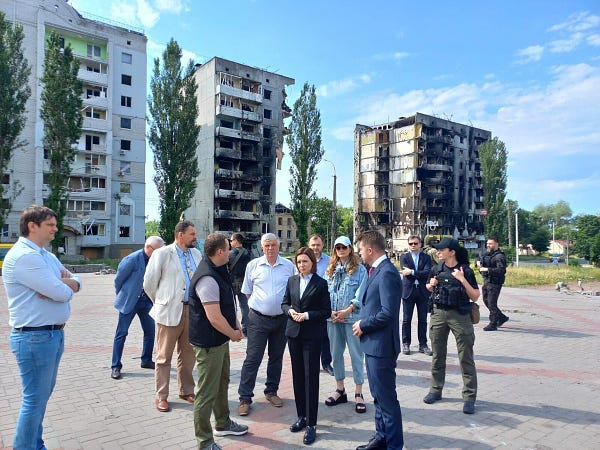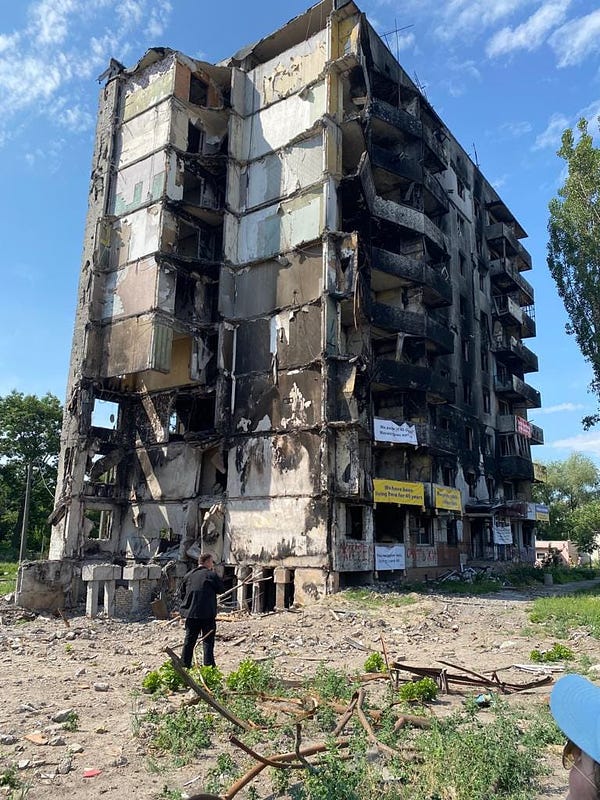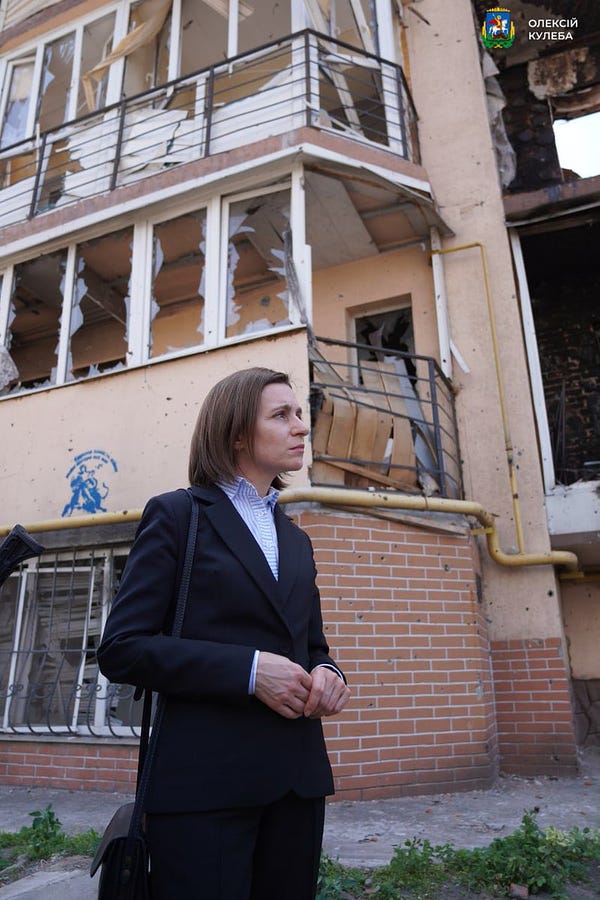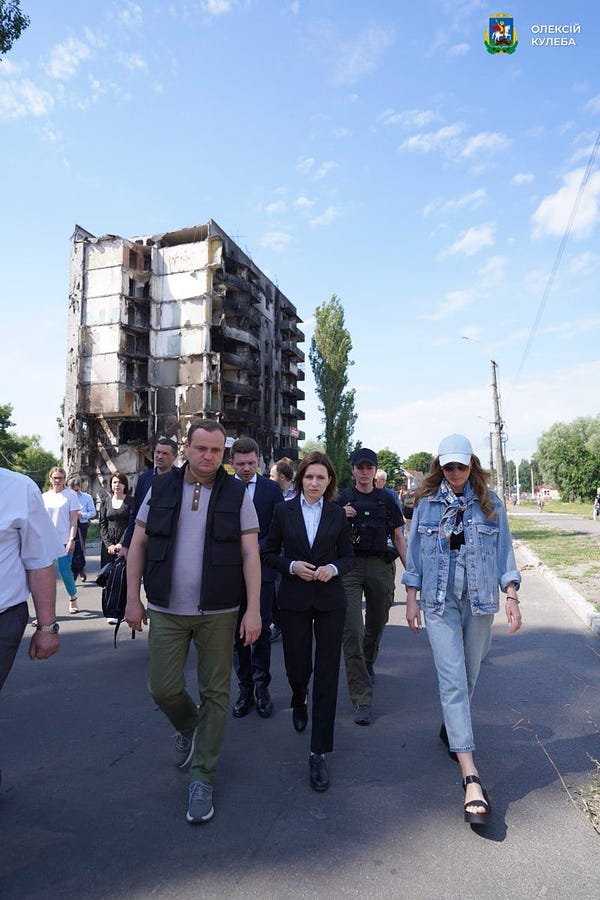Welcome back to Moldova Matters! In this weekly roundup we will check in with the top stories of the week in Politics and Economics. Subscribe to Moldova Matters to get our Weekly Roundup and other content sent right to your email! And consider becoming a paid subscriber to support our work at Moldova matters. For just $5 / month, the price of a nice coffee, you can support this work and help us expand into even better content!
War in Ukraine
In this past week we have seen multiple developments in the war as the Russian invasion creeps forward slowly in eastern Ukraine. Facing pressure and possible encirclement by Russian forces, Ukrainian troops withdrew from Lysychansk in a tactical retreat. This leaves Russia in full control of the Luhansk Oblast but still only represents a small advance made in the last months as the war grinds on in this new phase. Meanwhile, Ukrainian forces drove Russian troops off Snake Island in the Black Sea and raised the Ukrainian flag over the only part of the Odessa Oblast to be occupied during this war.
In Odessa, missile strikes continued this week against multiple residential buildings and civilian targets leaving at least 20 dead and 38 injured. In one attack, the Children's Rehabilitation Center in Sergheevca was struck by a missile killing one person and wounding 5 others. This facility is owned by the Moldovan Ministry of Health who condemned the attack. The facility was recently renovated and considered to have among the best conditions of any facility in the Moldovan medical system. No children or patients were at the facility as the war caused it to close this spring.
Elsewhere in Odessa, one man was killed and another injured when they struck a mine while attempting to swim on a closed beach. The beaches are clearly marked with signs but the military administration of the city has chosen to put up additional fences after this accident saying:
“Not a single beach in the Odessa region will open. Now the coast is a line of defense, not a recreation area, ”
All of these actions are taking place very near to southern Moldova in locations that countless Moldovans have spent their summer holidays. The war remains very close to home.
President Sandu Visits Kyiv
President Maia Sandu visited Kyiv last week meeting with President Zelensky and visiting the sites of atrocities in Bucha and Irpin.





Speaking about her visit, the President said:
“I saw houses burned to the ground, residential areas destroyed by rockets, hospitals, shops and kindergartens, turned into ruins as a result of Russian artillery shelling in Borodyanka and Irpen . I also saw a mass grave site in Bucha, where dozens of people were buried who were shot by the Russian army during the occupation of this small town.”
She reaffirmed Moldova’s support for Ukraine and discussed with President Zelensky the opening of additional corridors for Ukrainian goods through Moldova as well as electricity and energy security questions.
At a joint press conference, President Zelensky answered a question on the threat from Transnistria and what would happen if Russian forces there attacked Ukraine. He said:
"..I would not call strikes from Pridnestrovie against Ukraine such a risk, but if there is, I think it will be a global mistake. We receive certain signals. They are unpleasant. But these people should know: they are in Transnistria on the temporarily occupied territory of Moldova. For us, this will not be a blow, but a slap in the face, and we will definitely respond with a blow, ”
President Zelensky noted that he consulted with President Sandu on security issues and that the 2 counties are keeping close contacts during this crisis.
Moldovan Security Updates
The Council of the EU has approved 40 million Euros in military assistance for Moldova, effectively doubling the national military’s budget overnight. This assistance is aimed at purchasing modern equipment and providing training for Moldova’s poorly equipped armed forces.
“This assistance will strengthen the capacity of logistics, mobility, command and control, cyber defense, unmanned aerial reconnaissance and tactical communications of the Moldovan armed forces, which will be provided with the necessary equipment, materials and services, including equipment-related training,”
These announcements led to harsh criticism from the “leaders” of Transnistria who accused the west of trying to provoke war in Moldova. They say that plans to “militarize” Moldova will harm confidence between the separatist region and Chisinau. The Moldovan Military responded that the country is not seeking to “militarize” but hopes to modernize its armed forces. They noted that Moldova has no military industrial base and hopes to look to partners for support in anti-tank weapons, air defense and more.
Bomb Threats Across Moldova
This week, police responded to 50 simultaneous bomb threats against buildings all across the country. Parliament, Government, various Courts, shopping centers, hospitals, and the airport all received threats and were inspected by police who found the threats to be false alarms. At the same time, the threats, which were sent by anonymous email, caused massive disruption with the entire airport being evacuated 3 times in 48 hours causing flight delays and major inconvenience. The Minister of Justice accused fugitive oligarch Plahotniuc of being behind the attacks as one of the courts that was evacuated was hearing arguments for his arrest in absentia at the time. The court continued its work after being checked by police and issued the arrest warrant. This is the first arrest in absentia in Moldova which only recently approved a law allowing for this process.
Police are investigating the threats but no one has officially been named as a suspect and the minister’s accusation seems to be speculation at this time.
Gagauzia Rumbling?
One of Moldova’s most significant security concerns should the Russian army advance to the Moldovan border is the autonomous region of Gagauzia which has long held Russian sympathies. In the past weeks the autonomous region has made multiple moves and announcements distancing themselves from the government in Chisinau and working to chart a different political path from the PAS government’s direction of reform and EU integration. This week, the People’s Assembly of Gagauzia announced that they were not consulted on the issue of EU candidate status for Moldova and stressed that they will continue to work on policies that develop the political and economic independence of the autonomy. They called on Chisinau to respect their decisions in the context of European values and note that they will decide on their support for EU ascension based on the decisions Chisinau takes in the process.
This is basically just a political warning to Chisinau not to forget that Gagauzia has strong opinions about the EU. In addition, there have been a number of legislative initiatives coming from the People’s Assembly that are non-starters and designed to create more divisions with Chisinau. Here are a few examples:
Special license plates for the region to separate their cars from the rest of Moldova
An anti-gay propaganda law modeled on the one passed by the Russian Federation that would make it illegal for people to speak publicly about LGBTQ rights
Special voting districts that would guarantee local representation in Parliament
Right now, none of these initiatives is likely to go anywhere. But it is worth noting the increased pace of combative legislation from the region. We’ll have to see where it goes.
Political Updates
This week, the Central Election Commission CEC approved a plan for electronic voting in future Moldovan elections. Under the plan people will be able to vote from anywhere in the world using their national ID and a valid electronic signature. There are currently no further details on how this process will work and the technical details still need to be developed. Moldova has a robust, if not always easy to use, electronic signature system that allows citizens to cryptographically sign documents from their computer or phone. Building the voting system around this will theoretically mean that the system has strong security built in, but will also mean that all citizens hoping to use the system will need to apply for and receive an electronic signature - which is not something most people have right now.
Implementing this proposal will be a major win for the PAS government as it will help citizens in the diaspora vote much more easily than the current system where people often drive hundreds or thousands of kilometers to a Moldovan Embassy, Consulate or other designated voting place. With the very high support PAS enjoys in the Diaspora this initiative plays directly to the party’s voting base and will assist with future “get out the vote efforts” as well.
Higher Education Reform
The Ministry of Education has proposed a sweeping overhaul to the country’s network of universities and technical colleges. The plan envisions a massive consolidation around a core set of larger universities that will each absorb many smaller institutes and colleges. The State University alone will absorb more than 15 smaller entities. The Ministry claims that the plan does not involve closing current entities but will simply combine their administration such that there are fewer institutions that are more robust. The plan envisions major investments in the new consolidated Universities for modernization and in order to make the institutions competitive in the modern economy. The government claims that few if any teachers will be fired in the process and suggests that salaries could go up in time.
What is unstated is that many many administrators are likely to lose their jobs to redundancy. This may even be the unstated purpose of some of these moves as university leadership is often hard to replace and many people have been in their positions since Soviet times and actively resist any changes.
Author’s Note: A few years ago the Moldova Small Enterprise Alliance organized a meeting with university leadership so that they could meet business owners and the private sector could provide feedback on the skills needed for the jobs currently on the market and coming in the future. This feedback is critical as many “computer science” degrees in Moldova do not actually involve any learning to program and retain a Soviet-era focus on theory and chalkboard exercises to this day. The meeting was a fiasco and within 5 minutes the university representatives were shouting at the business owners. Their basic premise (as discovered through the shouting) was that 1) Moldova has the finest universities in the world and no changes are needed, and 2) They have no intention to listen to “evil capitalists.” None of this is to say that Moldova does not have some very good teachers and universities - it is only to note that a major turnover in university administration and the injection of new blood is probably a good idea.
Various institutions have criticized the plan with the National Academy of Sciences claiming the plan was not decided on transparently and the University of Tiraspol claiming that reform should be halted until the “settlement of the Transnistria conflict” - basically no time soon. The Ministry responded by stressing that the plan is for “mergers not eliminations” and that the only eliminations would be of “waste” (*cough* reductant admin).
Economic Updates
Right now, the news in Moldova involves a never ending string of economic stories largely spurred by the crisis caused by the war in Ukraine. In order to address all the key ideas we’re going to do a rapid fire roundup of the top stories:
Infrastructure Investments in Prut and Nistru Rivers - Deputies from the PAS party are proposing a major infrastructure investment in the Prut and Nistru rivers so that the 2 waterways could again be navigable for passenger and cargo vessels. During the Soviet times, both rivers were used for barge transport, primarily of agricultural products. In the 90s the dock infrastructure was neglected and the rivers have not been dredged since the fall of the USSR. MP Vladimir Bolya claims that a barge can transport 1500 tons of wheat, as many as 680 trucks, for a fraction of the price per ton (45 euro / truck, 13 euro / river barge). Ideas like this were previously far fetched but given the massive restructuring of Moldova’s supply chain infrastructure it is possible that this idea could move forward and even attract international investments.
Inflation Continues - Official predictions remain at around 30% inflation in 2022 but some experts are worried that it will go higher. Studies released in the last week have tracked rising salaries and compared against inflation and the basket of goods most consumers purchase. The bottom line is that while salaries are up 12.5% nominally, they are actually down 12.8% in real terms.
Limits on Card Transaction Fees for SMEs - The PAS party, led by MP Dumitru Alaiba, is proposing a cap of 0.5% on credit and debit card processing fees for small and medium enterprises. The stated purpose of the reform is to encourage more SMEs to begin accepting card payments and to rebalance the playing field on which SMEs pay more in fees than large companies who can negotiate their own rates with card processors. The law is opposed by the American Chamber of Commerce AMCHAM representing both local banks and Visa / Mastercard. Experts note that while card usage has increased more than 5x in the last 4 years, fees have stayed the same.
Salary Increases at the National Railways - From July 1st, employees of the national railway will receive a salary increase of 89%. The average salary at the body will increase from 4050 to 8469 lei / mo. This news comes after the railways struggled in past years to make payroll sometimes failing to pay any salaries for up to 6 months. All salary arrears were paid by May 1st and now salary increases aim to pay a living wage for the body’s many employees.
Mortgage Rates Rise 5.3% - Borrowers in Moldova’s Prima Casa (First House) program saw their mortgage payments rise 5.3% on July 1st due to the National Bank raising the base interest rates. Government and parliament are working on targeted relief measures for poorer borrowers.
MoldovaGaz Requests Rate Rise - MoldovaGaz has asked regulators for a 45% increase in the price of natural gas to consumers. The company notes that they are currently selling gas for $696 / 1000 cubic meters while they are buying that gas for $980. In the context of major price raises being contemplated in a time of scorching summer heat people are starting to get very worried about the winter.
New Natural Gas Subsidies Program - Parliament is working to finalize a new subsidies program for natural gas. Citizens will be split into 6 categories based on consumption, ability to pay by percent of income, and how many people live in the house. Subsidies will depend on a household’s categorization. The final plan should be approved in late July.
The Price at the Pump is Falling - For the first time in months the price of gasoline and diesel fuel fell slightly this week as the national energy regulator updated price controls and noted that regional trends are favoring lower prices (finally). The changes are small for now but with news stories every week about new record prices at the pump a small shift in the other direction is welcome news.
Crime and Corruption
This week, it was announced that the Head of EU Prosecutor's Office Laura Koveshi, will visit Chisinau 11 - 14 July. Laura Koveshi is a legend in Romania where her aggressive moves to root out corruption resulted in the corrupt government firing her in 2018. Following her firing, the EU promptly offered her such a senior role in a major rebuke to Romania. Her visit to Moldova does not have an announced agenda but clearly comes in the context of Moldova’s new EU Candidate status. If the EU Prosecutor’s office is able to provide major support to Moldova’s anti corruption reforms that could be a game changer for the country’s attempts to rein in corruption and oligarchs. We’ll have to see what the results of the visit are.
Meanwhile, Mr. Dodon is facing new criminal charges in the long running Energcom corruption case. He is accused of organizing a scheme when he was Minister of Economy in 2008 - 2009 whereby a shell company was set up as a middleman in the purchase of energy for Moldova. This scheme netted $11.9 million in illicit profits and defrauded the taxpayers and citizens of this money by inflating utility bills across the whole country. Mr. Dodon has pled not guilty and claims that prosecutors will not be able to prove his guilt. It’s important to note that this is a long running case that Mr. Dodon has been implicated in for years and is not related to the other charges of illicit enrichment and treason that were brought against him recently.
And consider becoming a paid subscriber to support our work at Moldova matters. For just $5 / month, the price of a nice coffee, you can support this work and help us expand into even better content!



